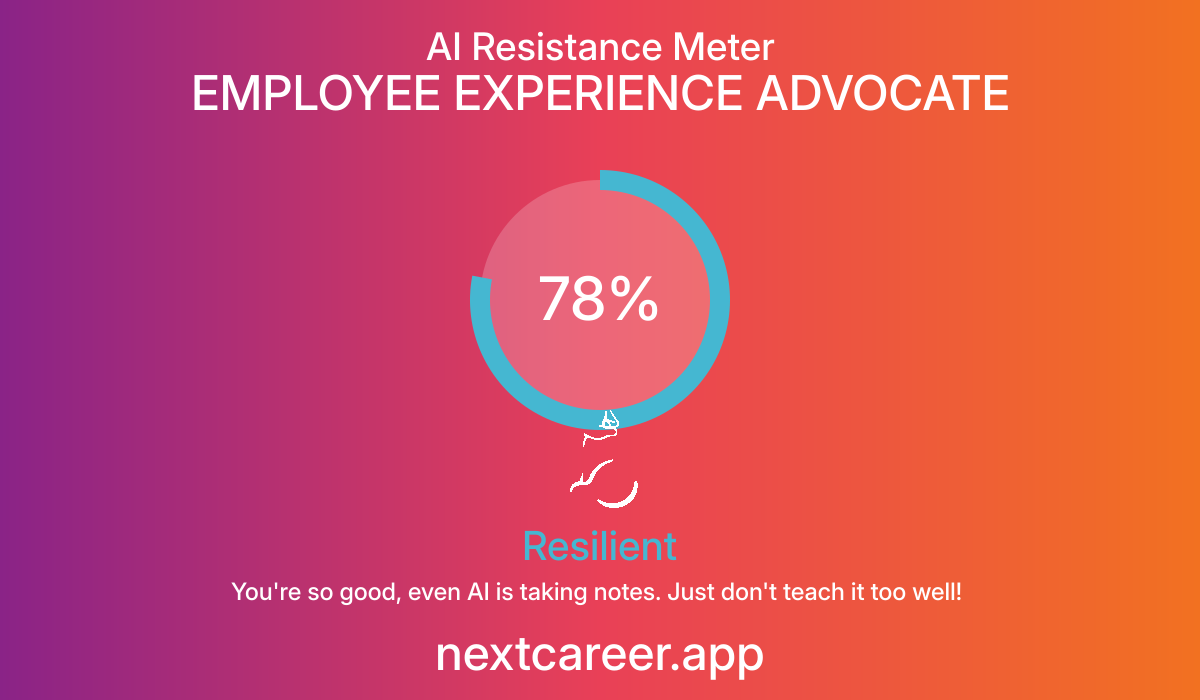AI Resistance Analysis
EMPLOYEE EXPERIENCE ADVOCATE
EMPLOYEE EXPERIENCE ADVOCATE
AI Resistance Score
AI Resistance Meter
Resilient
EMPLOYEE EXPERIENCE ADVOCATE
You're so good, even AI is taking notes. Just don't teach it too well!
The role of an Employee Experience Advocate heavily relies on emotional intelligence, interpersonal skills, and the ability to navigate complex human dynamics within an organization. While AI can assist in data analysis related to employee satisfaction and automate some feedback collection processes, the core of this role is grounded in human interaction, understanding context, and fostering workplace culture, which are less susceptible to automation. However, as AI tools become more prevalent in gathering and analyzing employee data, the role may adapt to encompass more strategic functions, focusing on higher-level analysis and integration of AI insights into actionable strategies.
The role of an Employee Experience Advocate heavily relies on emotional intelligence, interpersonal skills, and the ability to navigate complex human dynamics within an organization. While AI can assist in data analysis related to employee satisfaction and automate some feedback collection processes, the core of this role is grounded in human interaction, understanding context, and fostering workplace culture, which are less susceptible to automation. However, as AI tools become more prevalent in gathering and analyzing employee data, the role may adapt to encompass more strategic functions, focusing on higher-level analysis and integration of AI insights into actionable strategies.
Key Factors
- Cognitive Tasks: AI can analyze data quickly and identify trends in employee sentiment, but human interpretation and strategic planning are still essential.
- Emotional Intelligence: High reliance on emotional intelligence makes this role resistant to AI replacement, as human connection is irreplaceable in understanding employee needs.
- Physical Skills: Minimal physical skills required; the role primarily involves communication and strategic thinking, making it less vulnerable to AI.
- Creative Thinking: Creativity in developing tailored employee engagement initiatives remains a human advantage that AI cannot effectively replicate.
Human Advantages
- Deep understanding of workplace culture and dynamics can only be achieved through human experience.
- Ability to build trusting relationships and provide empathy during employee interactions is a significant strength.
AI Vulnerabilities
- AI may enable faster analysis of employee feedback and sentiment, potentially reducing the need for human advocates.
- Standardized survey approaches could lead to a one-size-fits-all mentality that AI tools might inadvertently promote.
Recommended Actions
- Invest in continuous emotional intelligence training to strengthen interpersonal skills.
- Adopt AI tools that enhance rather than replace human judgment in employee engagement strategies.
- Foster a collaborative environment where AI insights inform rather than dictate employee experience decisions.
- Stay updated on emerging HR technologies to leverage advancements for better understanding of employee needs and preferences.
In the near term, the role will focus on integrating AI tools for data analysis while maintaining the personal touch necessary for employee interactions. In the long term, we may see Employee Experience Advocates transitioning into more advisory roles, focusing on strategic use of AI insights to enhance workplace culture and employee engagement programs.

Why Calculate AI Resistance?
Understanding how AI-resistant your career is becoming increasingly important in today's rapidly evolving job market. Our analysis combines multiple factors including required human skills, technological adaptability, and future industry projections to give you a comprehensive view of your career's sustainability.